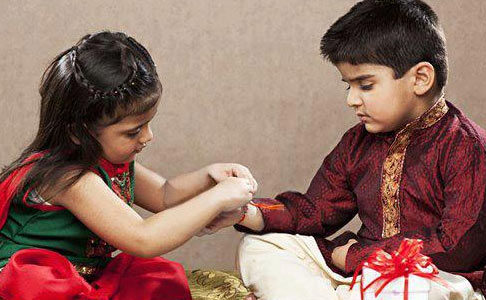The festival of Raksha Bandhan is celebrated every year in recognition of the sacred relationship between brothers and sisters. The highlight of this festival is the sister’s tying of the sacred thread, raakhi, around the brother’s wrist. This festival is observed as a symbol of duty between brother and sister.
There are several origin stories from the scriptures about this popular festival that celebrates the familial tie between brother and sister. In the Ramaayan, after her rescue from Lanka, it is said that Sita tied a raakhi on Lakshman’s wrist to invoke his continued protection. Another origin story is that Savitri tied a raakhi to an unscrupulous suitor who wanted her affection; he was then obliged to be her defender. During the Mahabharata war, it is said that Draupadi tied a raakhi on Shree Krishna’s wrist after he injured his finger. While it was bleeding, she tore a piece of her sari and tied it around the wound. In return, Shree Krishna promised to always defend her, as He eventually did. In the Bhavishya Purana, Indra, King of the Devas, was advised by Deva Guru Brihaspati to wear a raakhi as a safeguard against demons.
Historically, Nobel laureate Rabindranath Tagore started a Raksha Bandhan festival during the Partition of Bengal (1905) and asked Hindu and Muslim women to tie raakhis on men from the opposing side, making them their brothers and defenders. While its main significance is still to strengthen and uphold the relationship between a sister and brother, the festival has evolved over the years. Raakhis are sometimes tied between men that are considered to be brothers or who have assumed a protective attitude towards their “sister”. When a woman ties a raakhi on a man’s wrist, he is obliged by religious honour and duty to safeguard her. This festival widens one’s vision beyond the boundaries of one’s own family to the entire human race, signifying the concept of Vasudhaiva Kutumbakam, “the world is one family”.
On August 11th, 2022, on the full moon in the month of Shraavan (July-August), Hindu sisters and brothers prepare to strengthen their ties. This festival is considered highly auspicious as it expresses the sacred bond between a brother and sister. The observance encourages the strengthening of the relationship between both of them.
Sisters prepare their thaalis as they would for pooja, with a deeya, sweet offering, chandan, incense and so forth. First, they offer a prayer to God for long life, health and prosperity of their beloved brother. They then apply a teekaa. Aarti and incense are then offered, followed by the highlight of this festival, the tying of the sacred thread or raakhi on the brother’s wrist, and ending with the sweet, a delicious meethai. As is customary in Indian tradition, there is reciprocity. The brothers, in return, offer a small gift of appreciation to their sisters, whether it be an actual gift or a verbal endearment.



